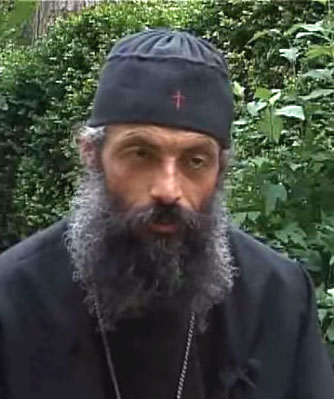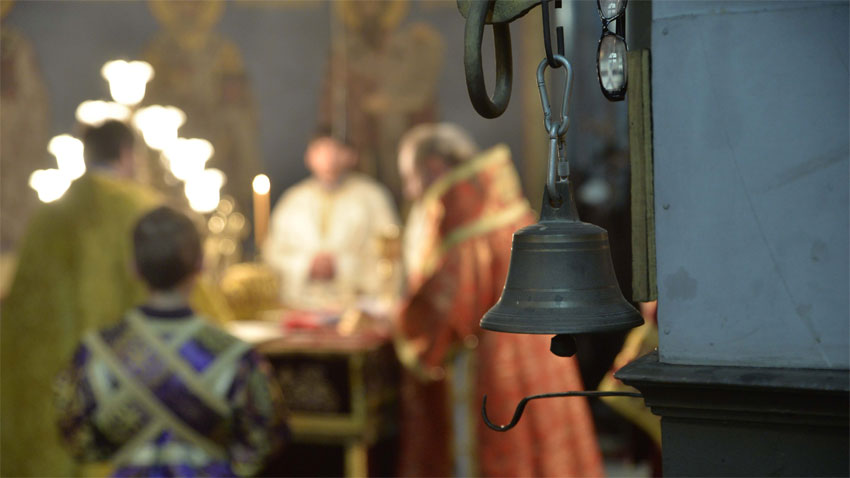After the Resurrection of Christ, one of the most celebrated Christian feasts is that of St. George the Victory- Bearer. He lived in a difficult period for Christian, which was the end of the third and the beginning of the 4th century, when believers were subjected to persecution and torture by Emperor Diocletian (284-305). St. George was just 20 years old, but he had everything that man back then was seeking for - a higher rank in the imperial army, place as a member of the state council, wealth. When the most violent persecutions against Christians started, he gave up his rank and gave his wealth to the poor. He accepted God in himself and started to defend the Christian faith, as “Christ Himself, Whom you persecuted, is Truth.” He is a Great Martyr and at the same time a Victory-Bearer, because through his martyrdom he acquired immortality. We met with Hieromonk Clement of the "St. John the Baptist" Monastery in Zhablyano, whom we talked about suffering, salvation and victory with.
 “St. George is one of the first martyrs for the Christian faith. His sufferings were extremely severe. The tortures he was subjected to were cruel. A Great Holy Martyr is one who accepted and endured severe torture, for which he was glorified by God as a saint. St. George was tied to a big spinning wheel and he was also given iron shoes with nails inside. He was running wearing them, saying to himself: ‘Run George, in order to reach!’ And in those sufferings that are unthinkable for today's Christian, the Lord appeared to him and told him, ‘I am with you! Do not give up!.’ George knew that the crown of glory awaited him in the Kingdom of Heaven. He is Victory-Bearer because he was victorious. In the spiritual life we follow the example of our savior Jesus Christ. He came to earth to bring new laws, a new kingdom, that is, new life, a new way of thinking. People scolded him, crucified him, he died, and they buried him. Anyone who looks at such a torture could say that the torturer is the victorious one, while the tortured is the defeated. Christ suffered all the sufferings to be victorious, and he was victorious with his Resurrection. Similarly St. George and the martyrs who walked along this path are the victorious ones. They became victors not here on the earth, but in the Kingdom of Heaven. There they are crowned after their torture on earth.”
“St. George is one of the first martyrs for the Christian faith. His sufferings were extremely severe. The tortures he was subjected to were cruel. A Great Holy Martyr is one who accepted and endured severe torture, for which he was glorified by God as a saint. St. George was tied to a big spinning wheel and he was also given iron shoes with nails inside. He was running wearing them, saying to himself: ‘Run George, in order to reach!’ And in those sufferings that are unthinkable for today's Christian, the Lord appeared to him and told him, ‘I am with you! Do not give up!.’ George knew that the crown of glory awaited him in the Kingdom of Heaven. He is Victory-Bearer because he was victorious. In the spiritual life we follow the example of our savior Jesus Christ. He came to earth to bring new laws, a new kingdom, that is, new life, a new way of thinking. People scolded him, crucified him, he died, and they buried him. Anyone who looks at such a torture could say that the torturer is the victorious one, while the tortured is the defeated. Christ suffered all the sufferings to be victorious, and he was victorious with his Resurrection. Similarly St. George and the martyrs who walked along this path are the victorious ones. They became victors not here on the earth, but in the Kingdom of Heaven. There they are crowned after their torture on earth.”
According to the story of the saint’s life, Saint George was killed on April 23, along with the wife of Emperor Diocletian – Alexandra, who also believed in Christ. In an article from 2007 Assoc. Prof. Dr. Hristo Temelski writes that until 1916 the memory of St. George was honored on April 23, but with the introduction of the Gregorian calendar, dates moved forward. This led to a change in the church feasts with fixed dates and St. George's Feast began to be celebrated on May 6th. In 1967 the Holy Synod decided that the fixed holidays should be celebrated on the dates set in liturgy books. In 1969-76, the date was April 23, and in the calendar for 1977 it was May 6.
“The priests prepare for the feast according to the service books for April. We cannot redefine already established days of celebrating saints' memory. Human interference breaks the connection between the heavenly church and the earthly one. The earth can celebrate a holiday on a given date, but is heaven celebrating it, too?,” the priest says.

What does the life of St. George, who gave up everything in the name of faith, teach us?
“It teaches us of doing feats. Regardless of the persecutions, he fearlessly declared his belonging to Christianity. He did not agree to worship idols. He gave sacrifice and served only God. And the Gospel reads that one cannot serve two masters. He gives an example that, regardless of the circumstances, one must observe and live according to faith in his soul.”
What is the place of today's Christian – that of a winner or loser?
“It depends on them! If a man respects the laws of God and what is written in his soul, because everyone knows what is good and what is bad; if they strive for the good, they will be victorious. When one fights evil that comes from outside and tries to get into them, they are victory bearers and in this way become closer to St. George.”
Does the world need victory bearers in the name of truth and what is righteousness today?
“The first victor who raised this flag was Jesus Christ. God, being the Creator of the whole Universe, of the people, put his Son next to his creation, in order to bring man the freedom he expected. The Lord has given us an example that in order to achieve the perfection he engraved in us at creation, we must fight. We are made of two natures - perishable and incorruptible. The incorruptible is God's image in us. And through this inner struggle we have to make a choice. Human life is short. After that comes eternity. During this short time period, we must determine what our eternal fate would be.”
The book "Icons from the National Church Historical and Archaeological Museum" - a huge work of over 500 pages, with more than 700 published photographs and accompanying scientific articles, was officially presented a few days ago. The unique..
A humble military chaplain made his first contact with Bulgaria in 1921, arriving with the mission of searching for Italian soldiers who had disappeared without a trace during World War I. However, he did not remain indifferent to the fate of this small..
Beloslav is a small town on one of the branches of Varna Lake. Yet it is here, in this quiet little town, that the only preserved Bulgarian submarine – Slava – is anchored . It was decommissioned a long time ago, and has now been turned in one of..
"You must have strong faith and pray - then the saint will help you and carry your prayer to God," says Father Georgi Markov of the Church of St...

+359 2 9336 661
